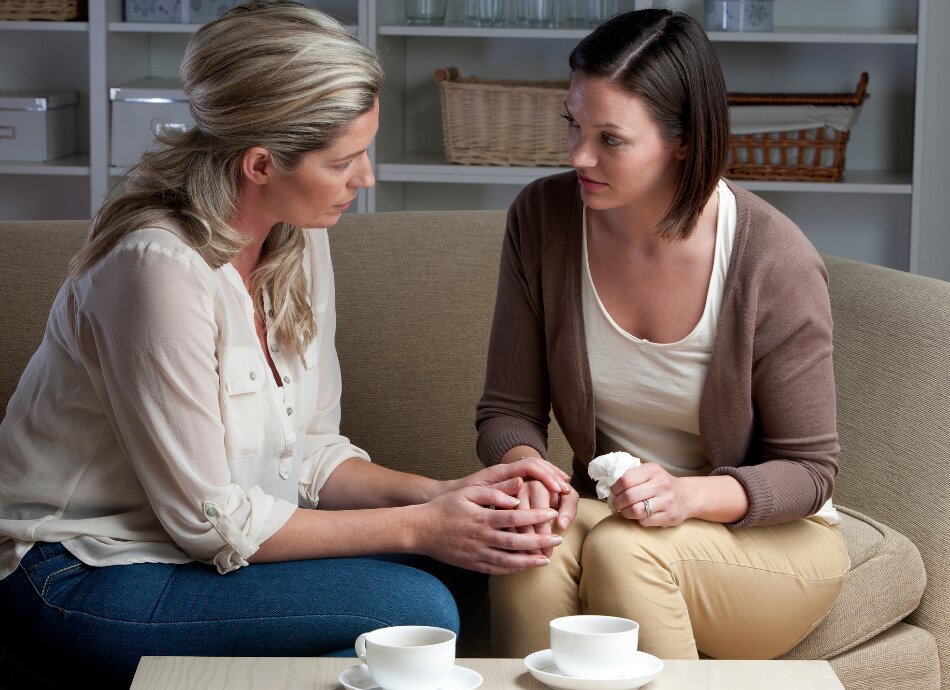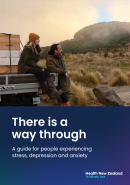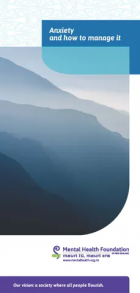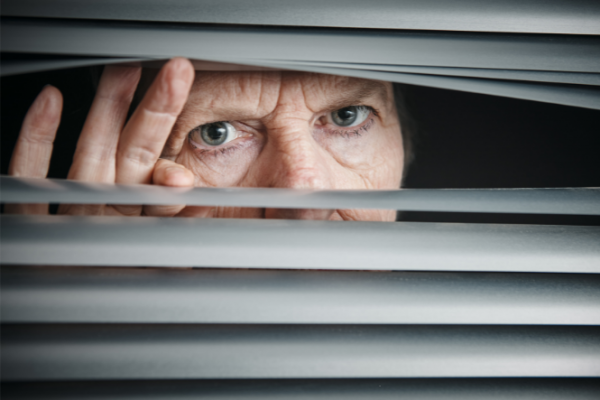Scam alert: Ads or websites claiming to have Medsafe approval or with the Medsafe logo are fake. Medsafe doesn’t endorse any health products, services or brands. Go to Medsafe for official information.
Anxiety | Mate māharahara
Key points about anxiety
- Anxiety (mate māharahara) is a normal human emotion.
- If it's so strong that it interferes with your day-to-day life, it could be an anxiety disorder.
- Anxiety disorders include social anxiety disorder, generalised anxiety disorder, panic disorder and others.
- Approximately 1 in 4 New Zealanders will be affected by an anxiety disorder at some stage in their lives.
- There are things you can do to manage and even overcome an anxiety disorder.

When you experience a threat, such as a car speeding towards you, your body releases adrenaline and stress hormones which help you to act to survive. You feel fear. Anxiety feels like fear, but the threat is perceived – that is, you believe there is a threat, but it isn’t right in front of you at that moment.
Anxiety is a normal human emotion. Most people experience some anxiety when facing a new, unknown situation, when a stressful event happens or something goes wrong in their life. However sometimes the anxiety keeps going after the problem has gone, the anxiety is intense even though the problem is ordinary, or there is no threat, but you worry ‘what might happen if…’. If this lasts a long time and interferes with your day-to-day life, it’s called an anxiety disorder.
Anxiety disorders are very common. Approximately 1 in 4 New Zealanders will have an anxiety disorder at some stage in their lives. At any one time, 15% of the population will be affected. The types of anxiety disorders include:
- social anxiety disorder (social phobia)
- generalised anxiety disorder
- separation anxiety disorder
- selective mutism (not talking)
- specific phobia (spiders, heights, flying, needles etc)
- panic disorder
- agoraphobia (fear of situations where escape might be difficult or embarrassing in the event of anxiety or other incapacitating symptoms).
- substance/medication-induced anxiety disorder.
Many different things can lead to anxiety disorders.
- Anxiety disorders can run in families, and having a family member with depression makes an anxiety disorder more likely too.
- Difficult past life experiences are a common background for anxiety disorders, eg, childhood abuse, neglect or bullying.
- Life events are common triggers for anxiety, eg, death of a loved one, job loss or relationship breakups.
- Having a long-term illness such as diabetes, arthritis or chronic obstructive pulmonary disease (COPD) makes an anxiety disorder more likely to happen.
- Medical conditions, eg, hyperthyroidism.
- Medicines and recreational drugs including salbutamol and prednisone, alcohol, caffeine, MDMA (Ecstasy), methamphetamine and cannabis.
Anxiety disorders have a range of physical and mental symptoms, such as:
- restlessness
- a sense of dread
- feeling constantly "on edge" or irritable
- difficulty concentrating
- impatience
- dizziness
- strong or irregular heartbeat (palpitations)
- dry mouth or sweating
- shortness of breath
- nausea and or stomach ache
- headache
- poor sleep.
The physical symptoms are caused by adrenaline and stress hormones. Symptoms can come on gradually or build up quickly. You worry about will happen because of the anxiety. This can lead to changes in your behaviour including avoiding things which might set off anxious feelings. You may find yourself withdrawing from social contact and not wanting to see your whānau and friends to avoid feelings of worry and dread.
Generalised anxiety disorder is a common type of anxiety disorder. This is when you’re extremely worried about many different things for longer than 6 months – even when there is little or no reason to worry about them. It can be hard to know what the cause is or why certain things trigger you to worry.
Other anxiety disorders have these symptoms too, as well as symptoms specific to the type of disorder. Read more about agoraphobia, phobias, panic disorder and social anxiety disorders.
If you think your feelings of anxiety may be an anxiety disorder you can start with a screening test called the GAD-7. The test is also available in multiple languages(external link).
Screening tests can’t diagnose an anxiety disorder. For this test if you score 5 or above, it means you should see a healthcare provider to talk about your responses.
You can choose to see a mental healthcare provider or make an appointment with your GP or nurse practitioner. Find a mental health professional(external link).
They will talk with you about your experience and explore possible causes. You may need a blood test to rule out other reasons for your symptoms.
You can improve your anxiety with the choices you make every day.
Exercise – you don’t have to wait until you feel like it. Read more about how to become more active.
Eat well – try to eat regular meals, a healthy breakfast, more fruit and vegetables and less processed food. Find out more about healthy eating basics..
Sleep – while anxiety can affect your sleep, not getting enough sleep can also contribute to making you more anxious. Make sleep a priority. Try the Twenty Winks Sleep Questionnaire to see what might be affecting your sleep and get some hints for managing it better.
Relaxation – Taking time each day to relax helps to reduce anxiety. Learn relaxation(external link) and breathing exercises or try yoga, Pilates or tai chi. Spend time outside in nature. Do things that you enjoy, make you feel comfortable or lift your mood.
Breathing – Box Breathing is a popular and powerful strategy to reduce anxiety.
Video: Box breathing tutorial
(Dee Jay, India, 2020)
Smoking – has been shown to make anxiety worse. Stopping nicotine needs to be done slowly so your your symptoms don’t get worse so talk with your healthcare provider or ring QuitLine for advice, support and nicotine replacement therapy. Read more about how to quit smoking.
Alcohol – is often used to lessen anxiety symptoms, especially social anxiety, but it makes anxiety worse the next day and over time. Aim to reduce your drinking to no more than 1 or 2 drinks per day or avoid it completely.
Recreational drugs – including some which are commonly used to reduce anxiety like cannabis, can cause anxiety either directly, or when levels drop. If you have an anxiety disorder, it’s best not to use any.
Support – build your support network – a few people you can go to when things are tough. There are also a range of support organisations. Some offer face-to-face meetings where you can talk about your difficulties and problems with other people. Many provide support and guidance over the phone or by email.
Ask your healthcare provider about local support groups for anxiety in your area or contact one of these support groups.
Apps reviewed by Healthify
You may find it useful to look at some mental health and wellbeing apps.
Anxiety disorders can be treated. There are a range of treatments available, including self-management tools, talking therapy, and medicines. A good first step is to talk to your healthcare provider who will discuss these with you and together you can decide which is best for you. Or you can decide to start with a self-management programme or seeing a mental healthcare provider.
Self-management tools
There are many online resources designed to help you manage anxiety. Some are downloadable workbooks/courses, which are useful for whanau who prefer to work on paper. Others can be done online. Some are free, some have a cost
- Just a Thought, NZ free online cognitive behavioural therapy course
- SPARX, NZ interactive game for young people
- Beating the Blues(external link) NZ an online course – needs your healthcare provider to register you.
- Computer-assisted learning for the mind CALM(external link) University of Auckland, NZ, free, downloads and audio files
- eCouch self-help(external link) Australia, interactive programme in modules
- Anxiety(external link) Centre for Clinical Interventions, Australia, free downloadable information and worksheets
Talking therapy
This is psychological therapy with a counsellor or psychologist. They will help you understand what is happening in your body and your thoughts when you feel anxious (psychoeducation) and work with you on how to change it. For anxiety disorders cognitive behavioural therapy is the type most often used, but your talking therapist might use another type such as acceptance and commitment therapy.
Even though it seems scary, doing your therapy with a group of others having a similar experience works well too, and can be more supportive and less costly.
Your GP or nurse practitioner can recommend a talking therapist, or you can find out from whānau or the Mental Health Foundation(external link). In some situations there is funding for talking therapy, especially if you have a community services card.
Medicines
Depending on how severe your anxiety is and what you have already tried, your doctor may prescribe medicines for anxiety. Medicine is best used together with talking therapy. Medicines help with symptoms but working through underlying problems is usually needed for long-lasting change.
Antidepressants, mainly selective serotonin reuptake inhibitors (SSRIs) are effective in treating panic disorder, social anxiety disorder and generalised anxiety disorder. Examples of SSRIs include citalopram, escitalopram, fluoxetine, paroxetine, sertraline. In some people, venlafaxine may be used for panic disorder. ead more about SSRIs and venlafaxine.
When starting these medicines, your healthcare provider will start you on a low dose and, if needed, will increase your dose slowly. This allows your body to get used to the medicine and reduces side effects. You must keep taking your medicine every day – not just when you feel anxious.
It may take 4 to 6 weeks to notice the full benefits of the medication. These medicines may initially make your symptoms seem worse before you notice an improvement. Other side effects include nausea (feeling sick), headache, sleep problems and sexual problems.
Other antidepressants such as tricyclic antidepressants may be used if SSRIs or venlafaxine are unsuitable or haven’t worked well. Read more about antidepressants.
Medicines are usually taken for a year and then slowly reduced and stopped.
Calm your mind(external link) Small Steps, NZ
Te Hikuwai resources for wellbeing – anxiety/manawapā(external link) Te Pou, NZ
Te Hikuwai resources for wellbeing – relaxation/mauri tau(external link) Te Pou, NZ
Anxiety NZ Trust(external link)
Anxiety(external link) Mental Health Foundation, NZ
The Big Feels Club(external link) Articles and podcasts about life + feelings
Mental Wealth(external link) NZ (especially young Pacific Peoples)
Brochures – New Zealand
Perinatal OCD – new baby, distressing repetitive thoughts(external link) Perinatal Anxiety & Depression Aotearoa, NZ
Anxiety and how to manage it(external link) Mental Health Foundation, NZ
Anxiety(external link) The Mental Wealth Project, NZ English(external link), te reo Maori(external link), Samoan(external link), Tongan(external link)
There is a way through(external link) Health Promotion Agency, NZ
Brochures – overseas
Note: The resources below are from overseas so some details may be different in New Zealand, eg, phone 111 for emergencies or, if it’s not an emergency, freephone Healthline 0800 611 116.
Mindfulness and letting go(external link) Centre for Clinical Interventions, Australia
The vicious cycle of anxiety(external link) Centre for Clinical Interventions, Australia
Simple steps to calm your emotions(external link) This Way Up, New South Wales Multicultural Health Communication Service, Australia English(external link), Arabic(external link), Chinese (simplified)(external link), Chinese (traditional)(external link), Filipino(external link), Greek(external link), Hindi(external link), Italian(external link), Korean(external link), Spanish(external link), Vietnamese(external link)
Apps
Mental health and wellbeing apps
References
- Te rau hinengaro – the NZ mental health survey(external link) Ministry of Health, NZ, 2006
- How does anxiety affect sleep?(external link) National Sleep Foundation, US
- Royal Australian and New Zealand College of Psychiatrists clinical practice guidelines for the treatment of panic disorder, social anxiety disorder and generalised anxiety disorder(external link) 2018
- Anxiety in Adults(external link) Auckland Community HealthPathways NZ, 2022
- Anxiety(external link) Patient Info, NHS, UK, 2023
- Balban MY, Neri E, Kogon MM, et al. Brief structured respiration practices enhance mood and reduce physiological arousal(external link) Cell Rep Med. 2023 Jan 17;4(1):100895
Clinical pathways and tools
Protecting and promoting mental wellbeing – beyond COVID-19(external link) The University of Auckland, The Centre for Informed Futures, NZ, 2020
Royal Australian and New Zealand College of Psychiatrists clinical practice guidelines for the treatment of panic disorder, social anxiety disorder and generalised anxiety disorder(external link) 2018
Guidelines – supporting young people with stress, anxiety and/or depression(external link)
Ministry of Social Development, NZ, 2015
Generalised anxiety disorder in adults(external link) BPAC, NZ, 2024
Mental health assessment tools(external link) BPAC, NZ
The psychological toolkit(external link) Black Dog Institute, Australia
Carpenter JK, Andrews LA, Witcraft SM, Powers MB, Smits JAJ, Hofmann, SG. Cognitive behavioral therapy for anxiety and related disorders – a meta-analysis of randomized placebo-controlled trials(external link) Wiley Online. 2018 Jan 20.
Generalised anxiety(external link) and mindfulness(external link) information sheets Centre for Clinical Interventions, Australia
Collaborative mental health and addictions credentialing programme - information for GPs and practice managers Collaborative Care NZ
Sensory modulation(external link) Counties Manukau Health, NZ
Primary mental health – brief interventions(external link) Te Pou, NZ
Te Hikuwai – resources for wellbeing(external link) Te Pou, NZ
Talking therapies for Pasifika peoples (external link) Te Pou, NZ, 2010
Talking therapies for Asian people(external link) Te Pou, NZ, 2010
He rongoā kei te kōrero – talking therapies for Māori(external link) Te Pou, NZ, 2010
A guide to talking therapies in NZ(external link) Te Pou, NZ, 2009
Continuing medical education
Stress, anxiety and depression – new approaches to diagnosis and treatment(external link) (Goodfellow Unit Webinar, NZ, 2020)
Talking mental health with young people at secondary school(external link) Anna Freud National Centre for Children & Families, UK
Brochures

Health Promotion Agency, NZ, 2022

Anxiety and how to manage it
Mental Health Foundation, NZ, 2024
Credits: Healthify editorial team. Healthify is brought to you by Health Navigator Charitable Trust.
Reviewed by: Dr Suzanne Henwood, Director, MBraining4Success, Auckland
Last reviewed:






